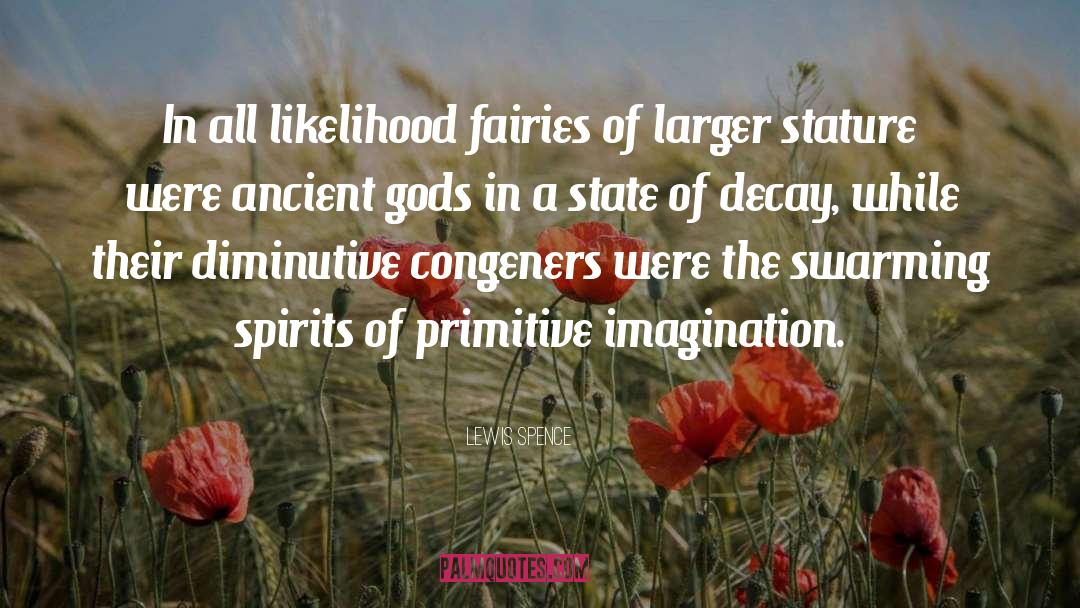Lewis Spence Famous Quotes
Reading Lewis Spence quotes, download and share images of famous quotes by Lewis Spence. Righ click to see or save pictures of Lewis Spence quotes that you can use as your wallpaper for free.
This brings me to the question of the antiquity of the belief in fairies and to the associated problem of the existence of strata or stages in fairy belief. The antiquity of the belief is revealed by the wide distribution of tales concerning fairies, while it is also indicated by the antipathy of the elves to iron and salt - ancient taboos both. Not only so, but many traits respecting fairies, especially shape-shifting and the belief in their semi-corporeal state, are eloquent of primitive notions. That the process of the fairy belief witnessed more than one stage of development in the course of successive ages appears more than probable. 'The fairies of one race,' remarks Wentz, 'are the people of the preceding race.' If this statement lacks a certain precision, one realizes the implication; that is, that the ghosts or gods of a preceding race may come to be regarded by their successors as fairies.
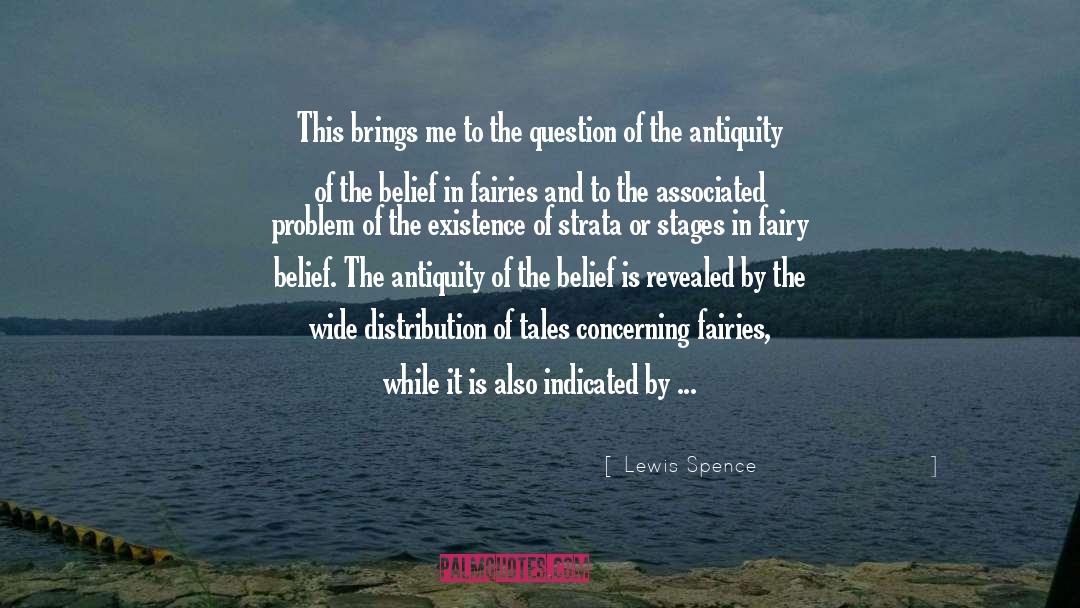
On the conversion of the European tribes to Christianity the ancient pagan worship was by no means incontinently abandoned. So wholesale had been the conversion of many peoples, whose chiefs or rulers had accepted the new faith on their behalf in a summary manner, that it would be absurd to suppose that any, general acquiescence in the new gospel immediately took place. Indeed, the old beliefs lurked in many neighbourhoods, and even a renaissance of some of them occurred in more than one area. Little by little, however, the Church succeeded in rooting out the public worship of the old pagan deities, but it found it quite impossible to effect an entire reversion of pagan ways, and in the end compromised by exalting the ancient deities to the position of saints in its calendar, either officially, or by usage. In the popular mind, however, these remained as the fairies of woodland and stream, whose worship in a broken-down form still flourished at wayside wells and forest shrines. The Matres, or Mother gods, particularly those of Celtic France and Ireland, the former of which had come to be Romanized, became the bonnes dames of folklore, while the dusii and pilosi, or hairy house-sprites, were so commonly paid tribute that the Church introduced a special question concerning them into its catechism of persons suspected of pagan practice. Nevertheless, the Roman Church, at a somewhat later era, reversed its older and more catholic policy, and sternly set its face against the cultu
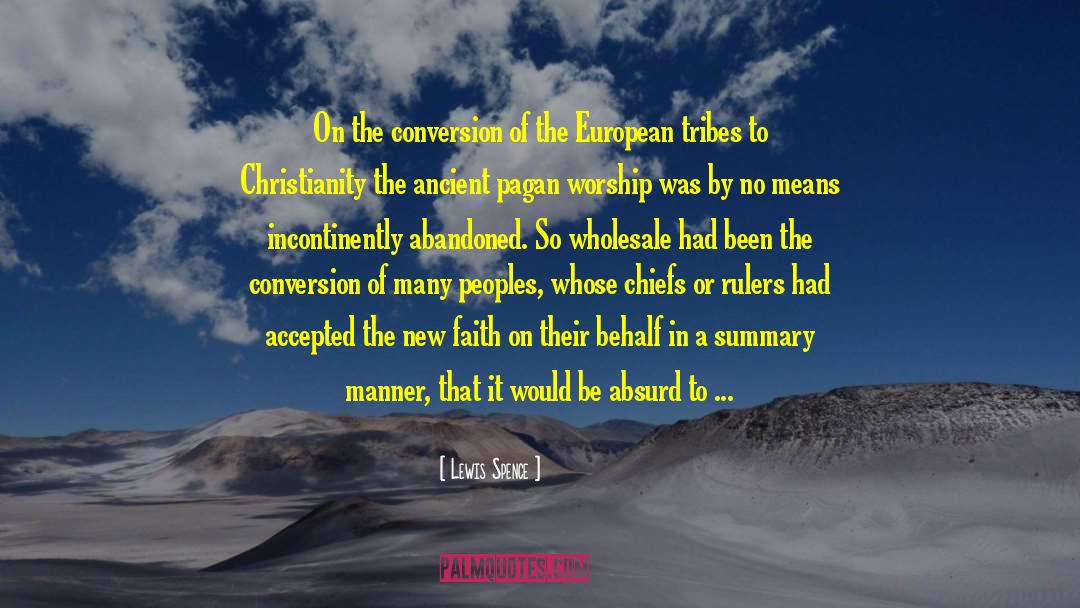
I should add, however, that, particularly on the occasion of Samhain, bonfires were lit with the express intention of scaring away the demonic forces of winter, and we know that, at Bealltainn in Scotland, offerings of baked custard were made within the last hundred and seventy years to the eponymous spirits of wild animals which were particularly prone to prey upon the flocks - the eagle, the crow, and the fox, among others. Indeed, at these seasons all supernatural beings were held in peculiar dread. It seems by no means improbable that these circumstances reveal conditions arising out of a later solar pagan worship in respect of which the cult of fairy was relatively greatly more ancient, and perhaps held to be somewhat inimical.
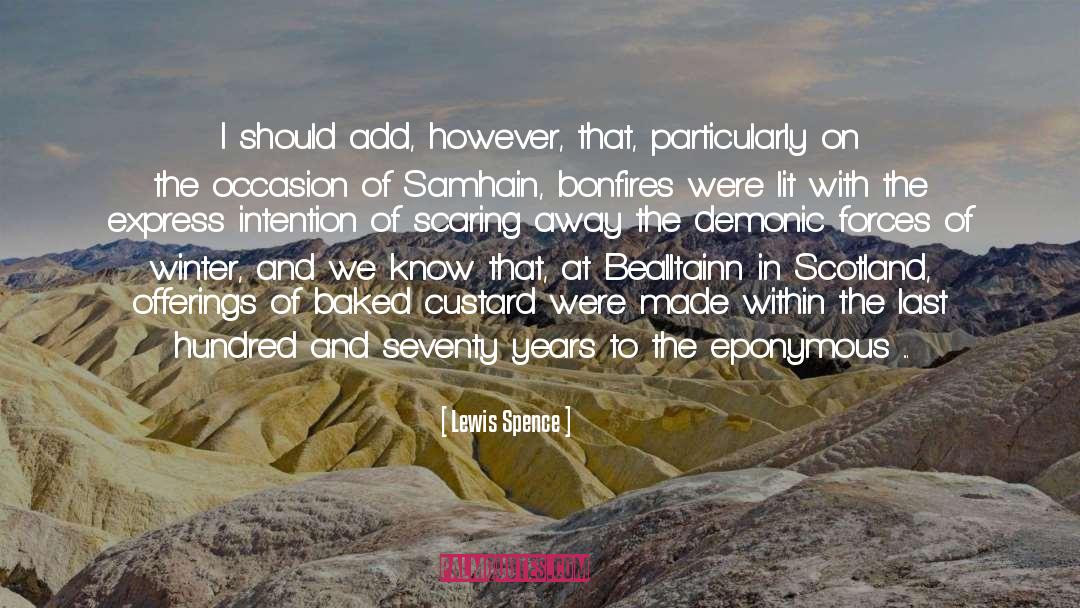
In my view the study of fairy origins assumes a greater degree of importance than popular opinion is wont to concede to it. Indeed, the ideas associated with it strike at the very roots of human belief and primitive methods of reasoning. It is scarcely to be questioned that the explanation of fairy origins is of the utmost value to the better comprehension of primitive religion. Later it will be made clear that, for the writer at least, the whole tradition of Faerie reveals quite numerous and excellent proofs of its former existence as a primitive and separate cult and faith, more particularly as regards its appearance and tradition in these islands.
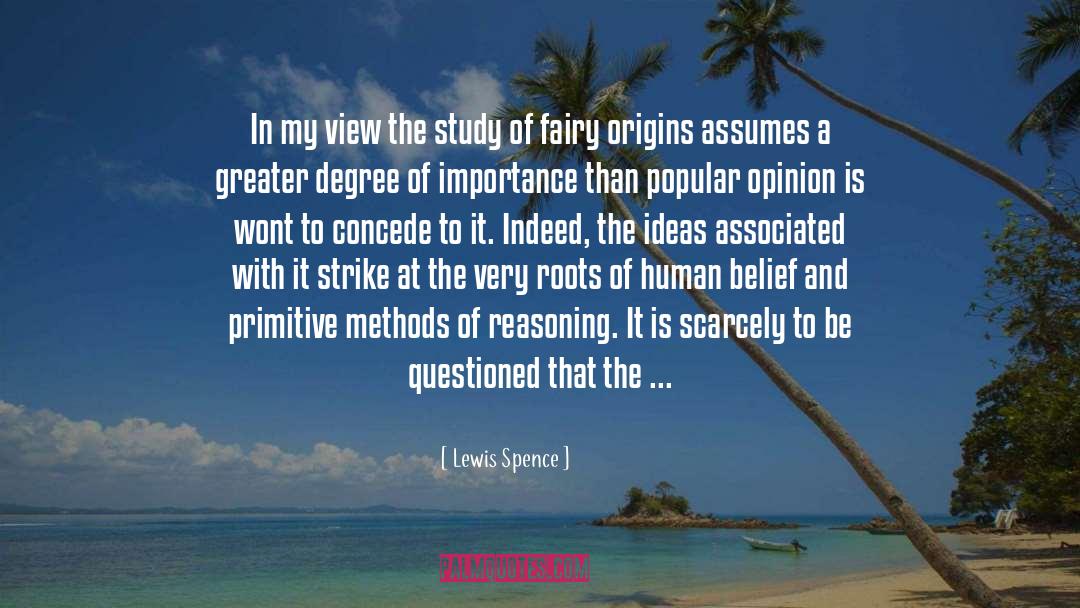
Here it is necessary briefly to consider the question of the cult of ancestors before venturing farther. The spirits of the departed are believed to be possessed of supernatural powers which they did not enjoy in the flesh. They may also be dissatisfied or malignant in consequence of being suddenly deprived of life, and if they are neglected by the living, are apt to be revengeful. Therefore they must be cajoled and propitiated. Fear of beings belonging to a mysterious state or sphere of which he knew nothing continually haunted and terrified primitive man and induced in him what is known as" the dread of the sacred." It was every man's personal duty to attend to the demands or requirements of his deceased ancestors. At first he would succour his own immediate forebears with food and gifts; but it must have been borne in upon him that when his parents joined the great majority, the care of the spirits of their parents likewise devolved upon him... and, by degrees, he might even come to regard himself as responsible for the well-being of a line of spirit ancestors of quite formidable genealogy. These, through his neglect, might starve in their tombs; or, alternatively, they might crave his company. Because of vengeance or loneliness they might send disease upon him, for the savage almost invariably believes illness to be brought about by the action of jealous or neglected ancestors. The loneliness of the spirit-world is the dead man's greatest excuse for desiring the company o
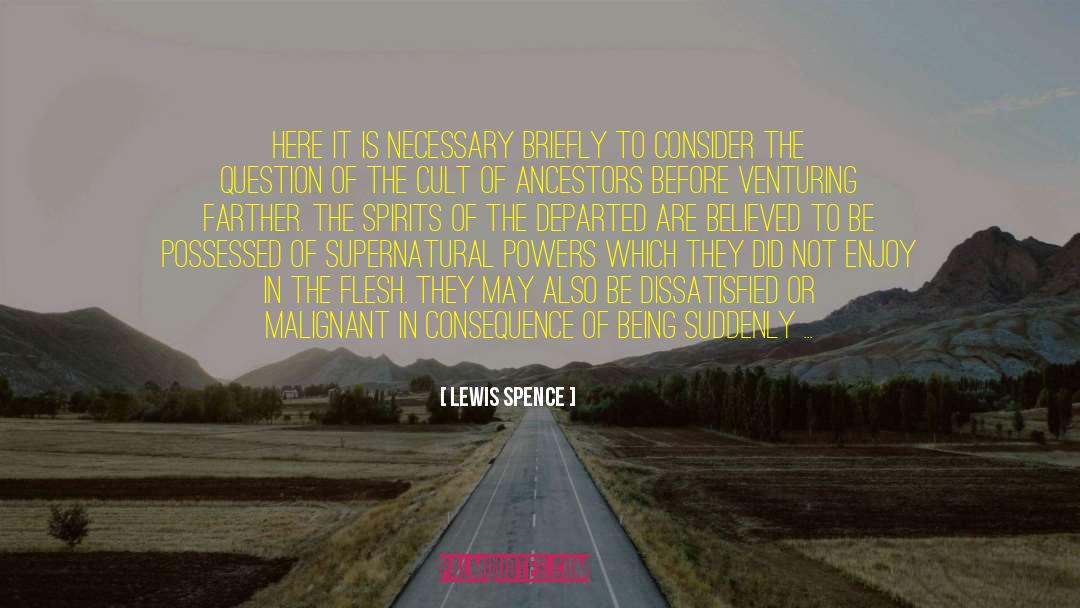
Robert Kirk believed the fairies to be the doubles or, as he called them, the 'co-walkers' of men, which accompanied them through life, and thought that this co-walker returned to Faerie when the person died.
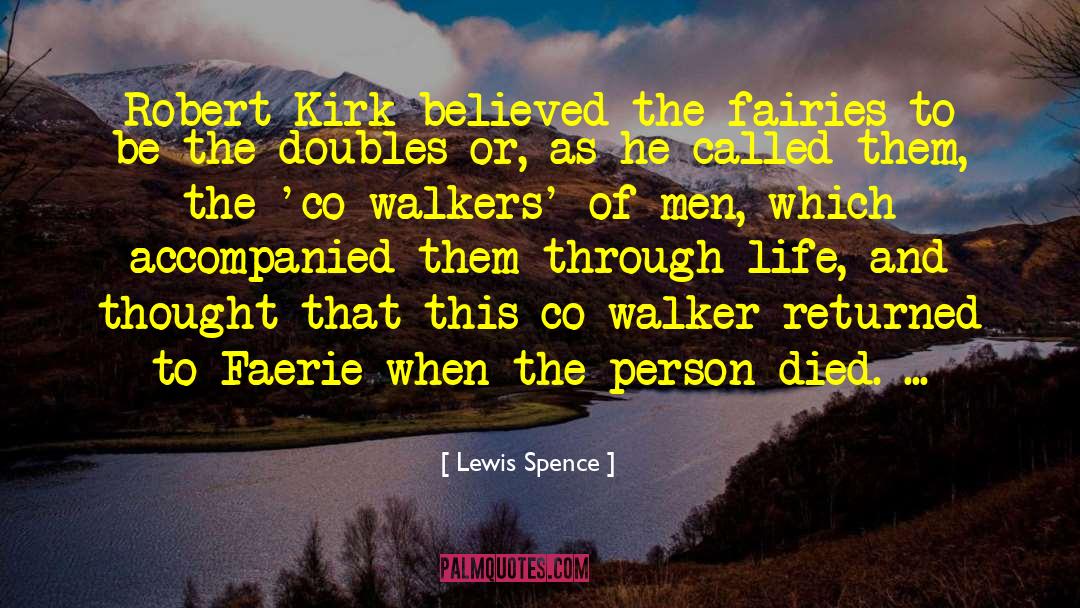
Some discussion of the nature and temperament of the fairies is necessary in view of its possible bearing on their origin. J. G. Campbell tells us that in the Highlands of Scotland they were regarded as "the counterparts of mankind, but substantial and unreal, outwardly invisible." They differ from mortals in the possession of magical power, but are strangely dependent in many ways on man. They are generally considered by the folk at large as of a nature between spirits and men. "They are," says Wentz, "a distinct race between our own and that of spirits.
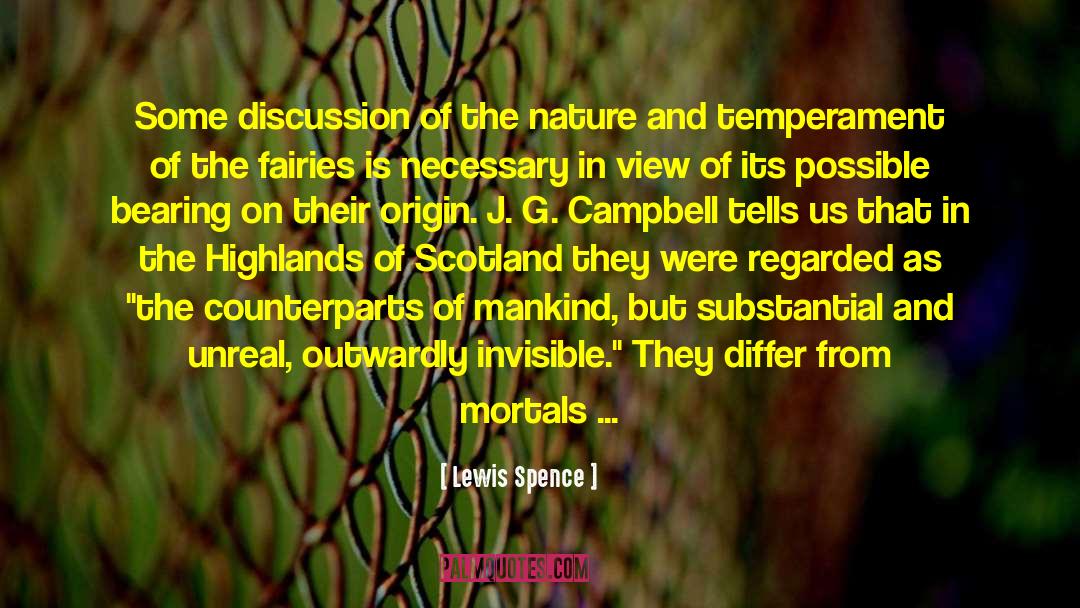
Quite a number of writers comment on the decidedly human character of the fairies, but it must be obvious that practically all supernaturals partake of human traits, more usually unpleasant ones, being as they are the projections of man's fear and imagination and created by him, psychologically, in his own image. Fairies are frequently described as being peevish, irritable, and revengeful to a degree. Grant Stewart says rather unmercifully of the Scottish fairies that their appetites are as keen as their inclinations are corrupt and wicked.
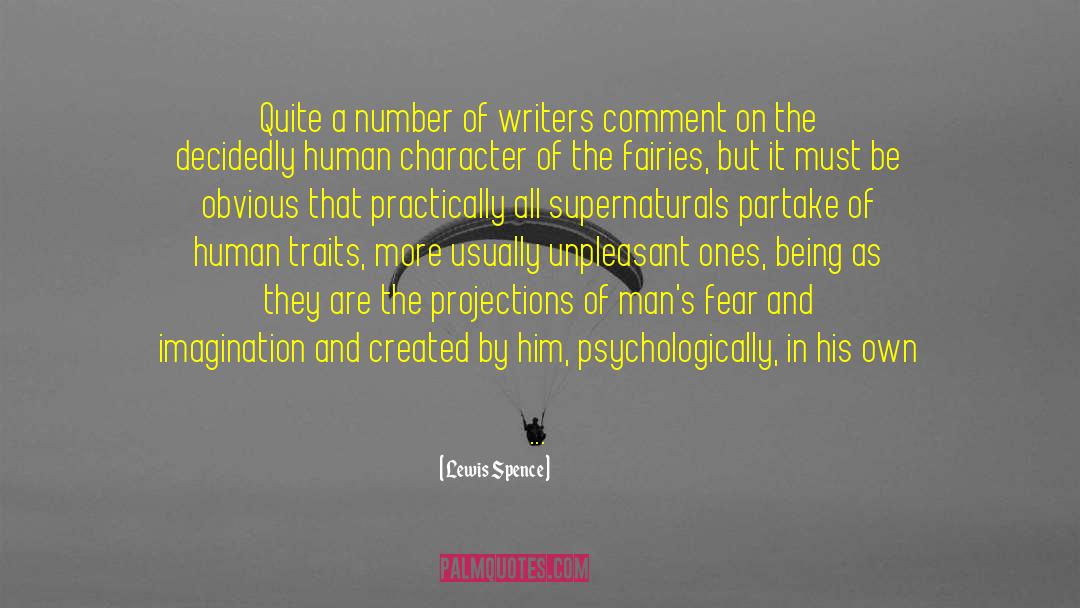
But this is not to say that a highly specialized body of belief such as that associated with Faerie is not capable of subsidiary explanations apart from this very general conclusion, specially in connection with those later and accretive ideas which must have grown up around it. Admittedly there is a common basis for the origin of all beliefs associated with the origin of spirits, which is to be found alone in the doctrine of animism. This notwithstanding, and with all due respect to the warnings of Krappe, Hartland, and others concerning the risks accruing to the scientific classification of spiritual forms, certain types of spirits with markedly separate characteristics have assuredly been conceived, and have been given diverse denominations and descriptions by those who believed in their existence. Of this the fairy type is indeed a case in point; and however correct it may be to say that it cannot basically be separated from the ghost, the goblin, or the demon, it has, in the course of ages, assumed characteristics which in a secondary sense distinguish it sufficiently from all of these to permit the scientific observer, and to some extent the peasant or the savage, to rank it as a separate variety of spirit, if not as a distinct species.
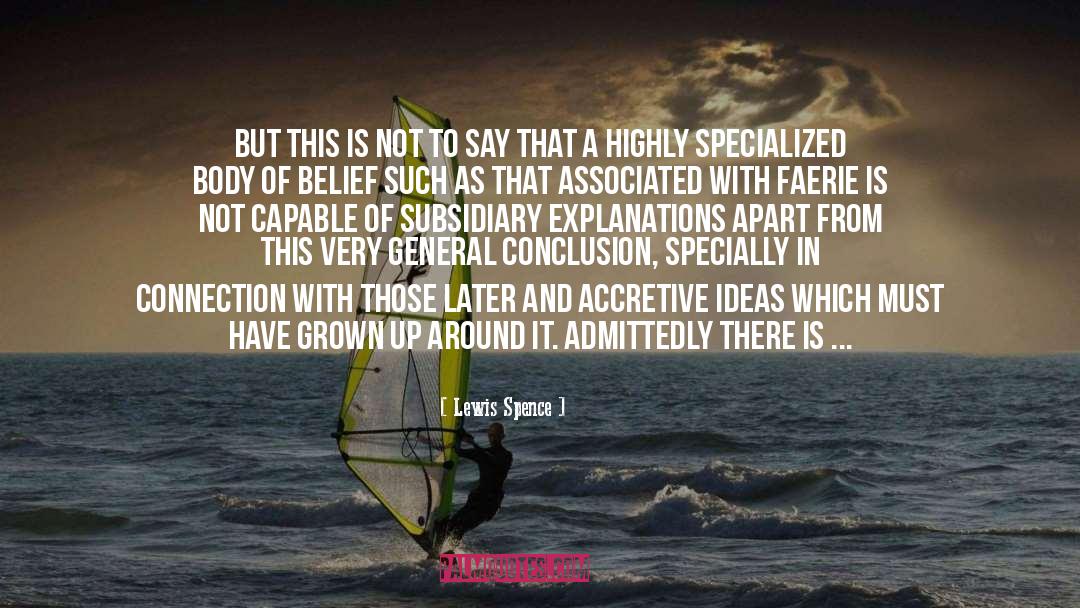
Some evidence seems to exist that an idea prevailed that in the fairy sphere there is a reversal of the seasons, our winter being their summer. Some such belief seems to have been known to Robert Kirk, for he tells us that 'when we have plenty they [the fairies] have scarcity at their homes.' In respect of the Irish fairies they seem to have changed their residences twice a year: in May, when the ancient Irish "flitted" from their winter houses to summer pastures, and in November, when they quitted these temporary quarters.
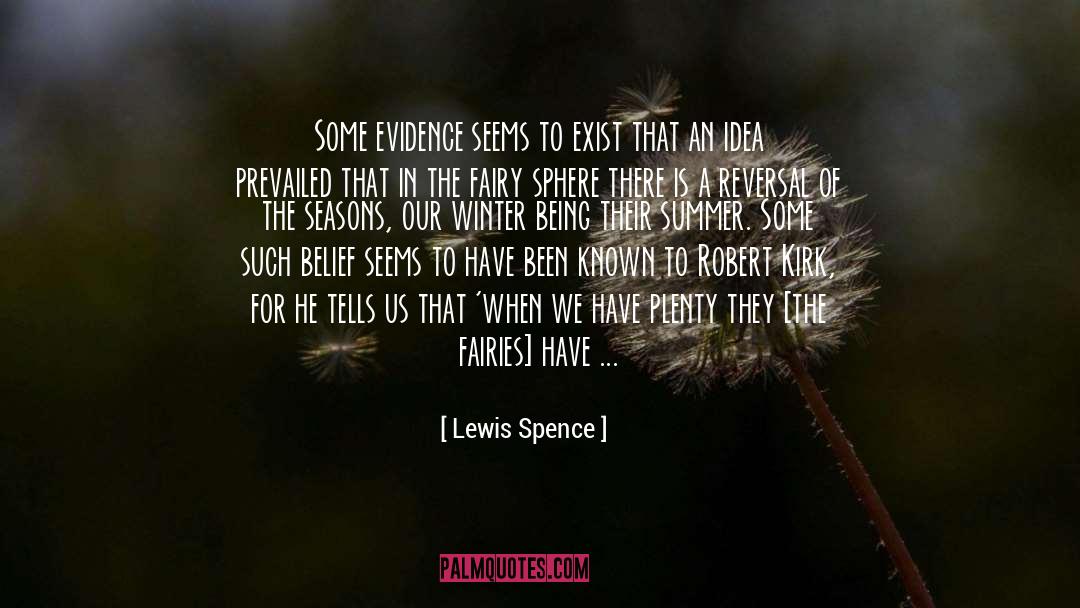
If we turn now to such vestiges of cult as are associated otherwise than with time and season, we discover a definite recognition of the survival of these nearly a century ago. Keightley, the old fairy mythologist, who did such yeoman service in the collection of much valuable elfin lore, says, as long ago as 1850, when referring to the confused nature of his subject: 'Indeed it could not well be otherwise, when we recollect that all these beings (the larger and greater fairies) once formed part of ancient and exploded systems of religion and that it is chiefly in the traditions of the peasantry that their memorial has been preserved.
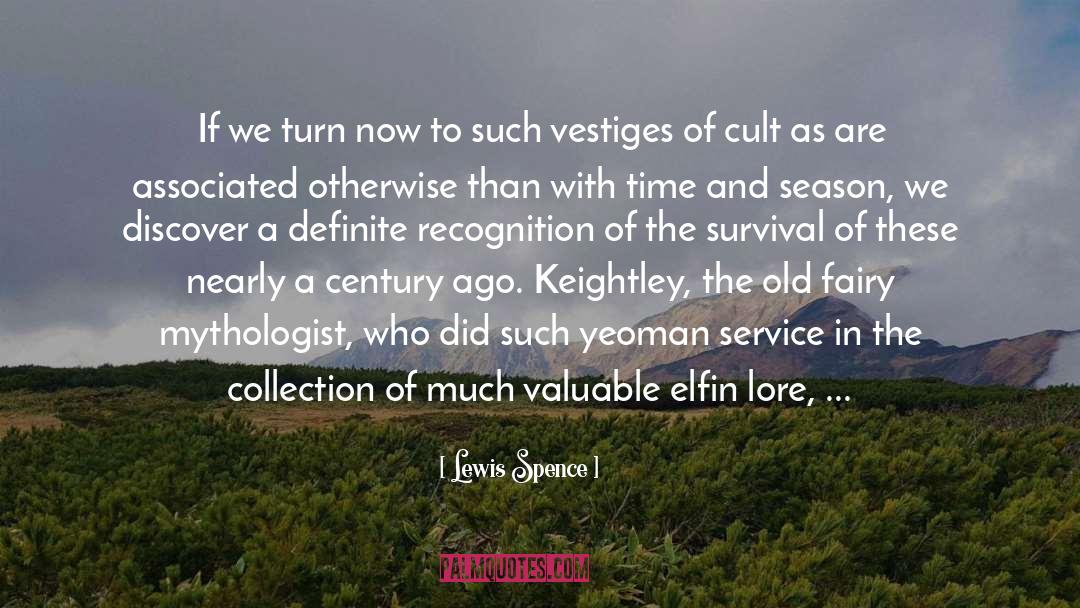
As Mr. R. U. Sayee has well said: 'It should be clear a priori that fairy lore must have developed as a result of modifications and accretions received in different countries and at many periods, though we must not overlook the part played by tradition in providing a mould that to some extent determines the nature of later additions.' It must also be self-evident that a great deal of confusion has been caused by the assumption that some spirit-types were fairies which in a more definite sense are certainly not of elfin provenance. In some epochs, indeed, Faerie appears to have been regarded as a species of limbo to which all 'pagan' spirits - to say nothing of defeated gods, monsters, and demons - could be banished, along with the personnel of Olympus and the rout of witchcraft. Such types, however, are usually fairly easy of detection.
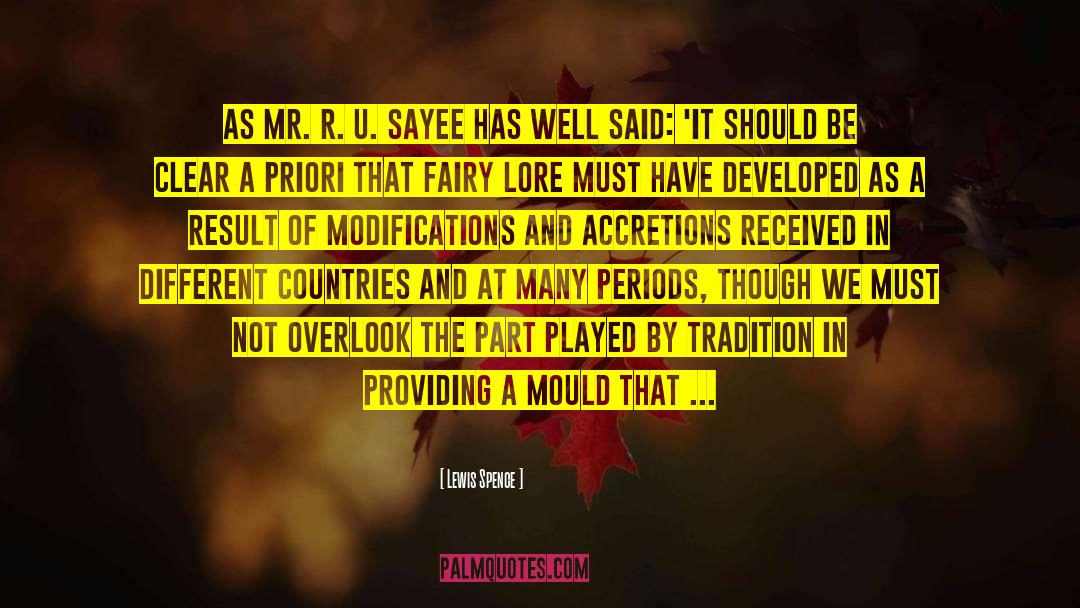
In the secret island the Druid shall dwell once more, and the Bard, the slave of the harp, utter the speech of the Gods.
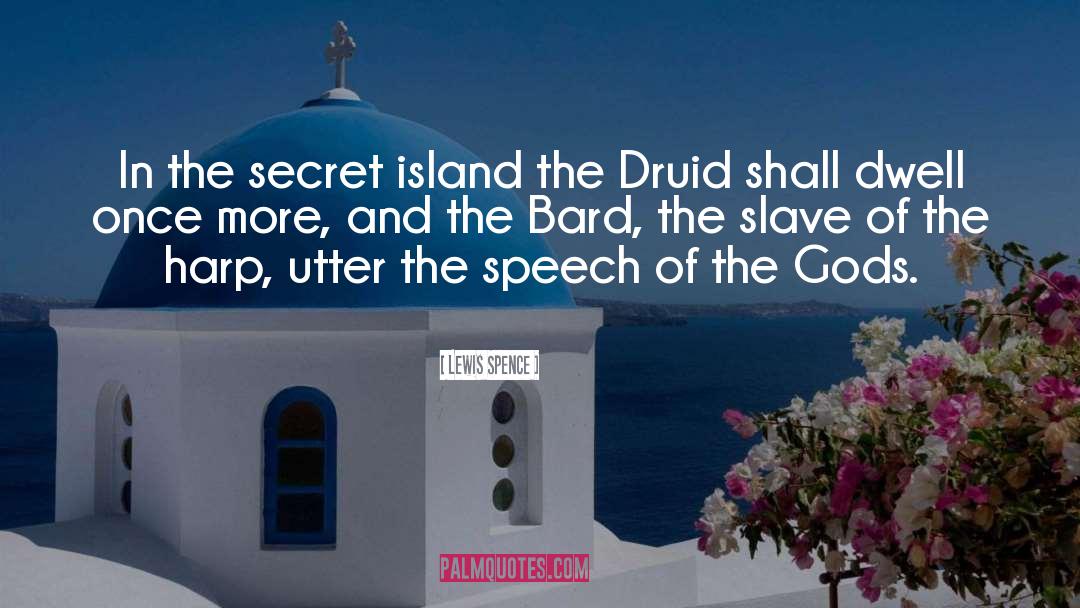
All three of the English types I have mentioned can, I think, be accounted for as the results of the presence of different cultures, existing side by side in the country, and who were the creation of the folk in ages distantly removed one from another. In a word, they represent specific " strata" of folk-imagination. The most diminutive of all are very probably to be associated with a New Stone Age conception of spirits which haunted burial-mounds and rude stone monuments. We find such tiny spirits haunting the great stone circles of Brittany. The "Small People," or diminutive fairies of Cornwall, says Hunt, are believed to be "the spirits of people who inhabited Cornwall many thousands of years ago. "The spriggans, of the same area, are a minute and hirsute family of fairies" found only about the cairns, cromlechs, barrows, or detached stones, with which it is unlucky to meddle." Of these, the tiny fairies of Shakespeare, Drayton, and the Elizabethans appear to me to be the later representatives. The latter are certainly not the creation of seventeenth-century poets, as has been stated, but of the aboriginal folk of Britain.
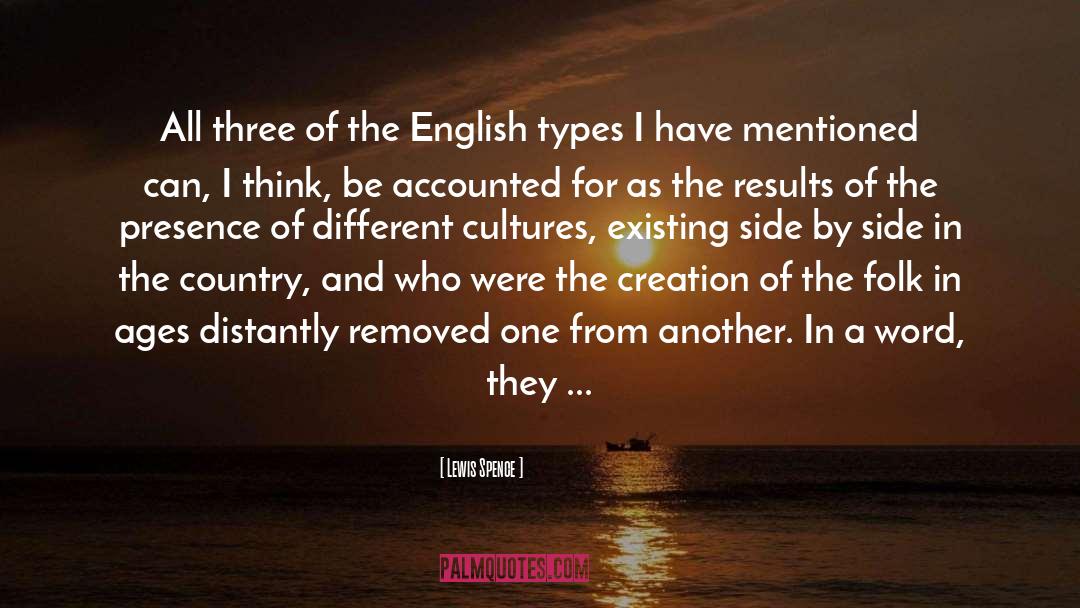
And even these ((the common hill fairy, the standard elf of folk-lore) are in danger of being banished into the limbo of forgetfulness by the quite artificial fairy of juvenile literary commerce, with gauzy wing and skirts reminiscent of the ballet. It has always seemed to me extraordinary that literature has been able to create wings where none were before, for our native fairies are as wingless as ourselves. But for such an innovation the Elizabethan poets and playwrights were probably responsible - a topic which we must consider in another chapter.
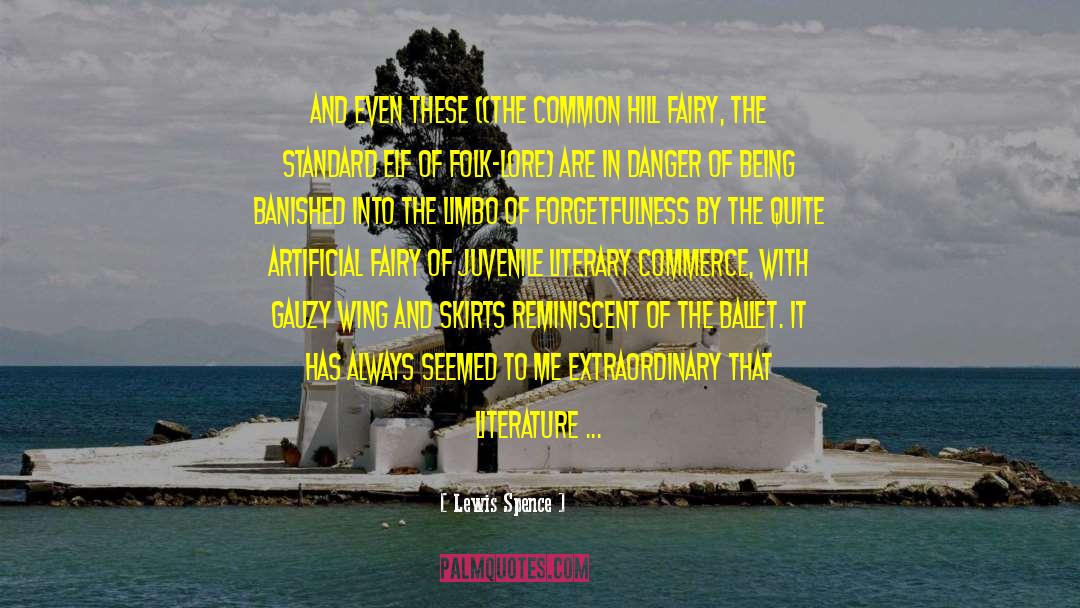
It must be understood that in some cases the process by which a god or goddess degenerates into a fairy may occupy centuries, and that in the passage of generations such an alteration may be brought about in appearance and traits as to make it seem impossible that any relationship actually exists between the old form and the new. This may be accounted for by the circumstance that in gradually assuming the traits of fairyhood the god or goddess may also have taken on the characteristics of fairies which Already existed in the minds of the folk, the elves of a past age, who were already elves at a period when he or she still flourished in the full vigour of godhead. For in one sense Faerie represents a species of limbo, a great abyss of traditional material, into which every kind of ancient belief came to be cast as the acceptance of one new faith after another dictated the abandonment of forms and ideas unacceptable to its doctrines. The difference between god and fairy is indeed the difference between religion and folk-lore.
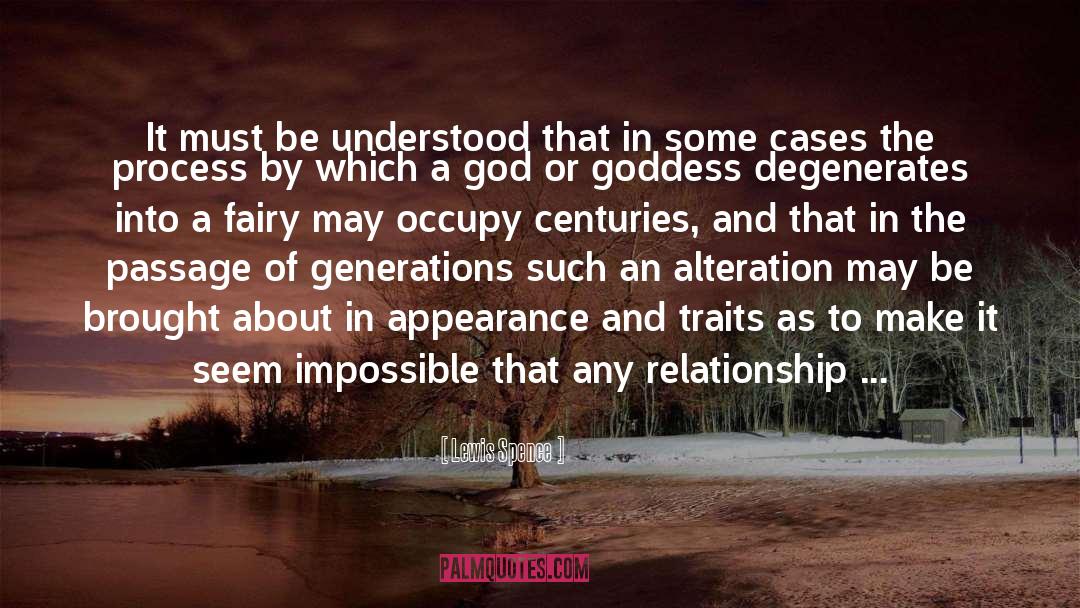
In all likelihood fairies of larger stature were ancient gods in a state of decay, while their diminutive congeners were the swarming spirits of primitive imagination.
